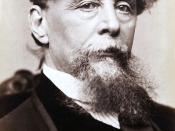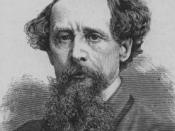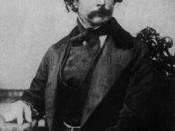The industrial revolution was an era of mechanization. During this era, in 1854, Charles Dickens (1812-1870) wrote Hard Times to comment upon the change within society and its effect on its people. ÃÂDickens points out the flaws and limitations of this new society in his eloquent and passionate plea on behalf of the working poorÃÂ (Charles DickensÃÂ Hard Times, 2000). The novel shows presents to readers the authorÃÂs perspective of life during the nineteenth century and makes comments on the central theme of fact versus fancy. Due to this theme, the novel ends with many characters realising that a person needs more than just fact in their life. The novel examines the utilitarian system through various characters such as Tom, who has been brought up in the utilitarian education system. Dickens exposes his own views on this system through Sissy Jupe, the uneducated daughter of a circus master, and the positive influence she has on the Gradgrind family.
Thomas Gradgrind has a strong rationalist philosophy and believes that fact, and fact alone is the ÃÂone thing needfulÃÂ but through the satirical way Thomas Gradgrind is described, Dickens makes his own comments regarding his conflicting views of this philosophy. Dickens introduces Mr Gradgrind as ÃÂThomas Gradgrind, sir. A man of realities. A man of fact and calculationsÃÂ with a rule and a pair of scales, and multiplication table always in his pocket, sir, ready to weigh and measure and parcel of human natureÃÂ (p48). This portrays Gradgrind as a man who places a numerical value on everything and does not believe in anything other than black and white fact. Gradgrind is described with a satirical tone which signifies that Dickens is mocking Gradgrind and the system which he believes in. Dickens ridicules Gradgrind through his use of sarcasm against him.


